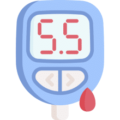Authors:
Katelyn Currier, PharmD
Jennifer Trujillo, PharmD, BCPS, CDCES, BC-ADM
Reviewers:
Laura McAuliffe, PharmD, BCACP, CDCES
Stefanie Nigro, PharmD, BCACP, CDCES
Citation:
GRADE Study Research Group, Nathan DM, Lachin JM, et al. Glycemia Reduction in Type 2 Diabetes – Glycemic Outcomes. N Engl J Med 2022; 387(12): 1063-1074.
The Problem
Type 2 diabetes (type 2 DM) is a progressive disease caused by a variety of pathophysiologic defects.1 Achieving good glucose control has been shown to reduce the risk of long-term complications.2,3 However, even with substantial advances in treatment, glycemic control remains elusive, and most patients require combination therapy.1,4 A recent study assessing trends in diabetes control in the United States found that only half of the people with diabetes achieved an A1C <7% between 2015 and 2018.4 Although numerous clinical trials have demonstrated the glucose-lowering efficacy of individual antihyperglycemic agents typically over 16 to 24 weeks, large-scale head-to-head studies comparing the effectiveness of multiple medication classes over longer durations (years) are needed. The Glycemia Reduction Approaches in Type 2 Diabetes: A Comparative Effectiveness (GRADE) study sought to investigate the glucose-lowering efficacy of several diabetes medications in combination with metformin.




 iForumRx.org is a web-based community of practice designed to inform ambulatory care pharmacy specialists, pharmacy residents, and student pharmacists about high-quality, practice-changing evidence.
iForumRx.org is a web-based community of practice designed to inform ambulatory care pharmacy specialists, pharmacy residents, and student pharmacists about high-quality, practice-changing evidence.